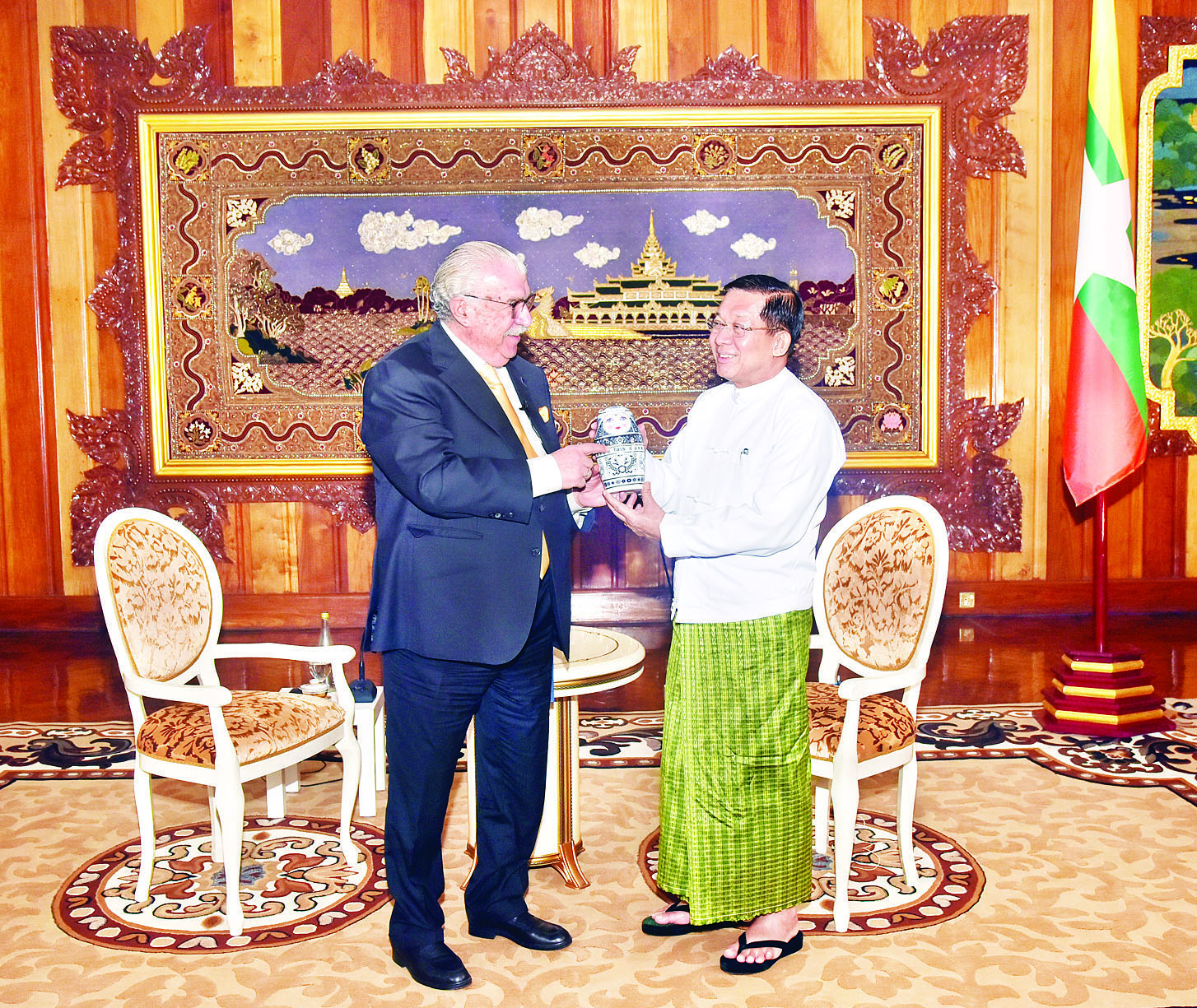According to the Russian TV show “The Formula of Power,” Min Aung Hlaing has a powerful handshake.
“When we shook hands a moment ago, I could feel your strength,” the award-winning interviewer confides as part of his “traditional question” about what war criminals do for fun.
Is this Russian satire? The answer may be in the transcript of the interview published by junta-controlled media. Min Aung Hlaing may believe he is presenting himself as a family man and devout Buddhist, but his psychological distress slips through.
His answers also show that “skyful of lies” – the phrase habitually used by the military to dismiss reports of its human rights violations – has a use.
The interview jumps from questions about the meaning of Buddhism to the definition of “power” and shows that Min Aung Hlaing is hanging on to his lie that his coup was necessitated by voter fraud in the 2020 general elections.
He does admit, however, that his regime may not hold a fresh, nationwide election as he promised before. Instead, citizens will be allowed to vote in areas where it is possible to do so once stability is restored.
The Russian interviewer, who says he has visited Myanmar many times, is curious about what dictators do in their spare time. Min Aung Hlaing, who has only been interviewed by two other foreign media agencies, from China and Russia, since the coup, says he does not have much spare time because he has two roles: military chief and head of the regime’s governing body, the State Administration Council.
“But I take care of my health. I go walking every morning. If I have time, I play golf on weekends. Then I read books. Moreover, I try to build a warm family,” Min Aung Hlaing is quoted as saying.

He says he is also a doting grandfather, but does not mention the families who have lost members to death or distance since he staged a coup. He ignores the campaign of terror he unleashed, the arbitrary arrests and killings, imprisonment, arson attacks, and the air and artillery strikes on towns and villages – all done so that he can maintain his grip on power.
After calling Min Aung Hlaing a good husband and father, the interviewer asked what important life lessons he had taught his children.
Min Aung Hlaing replies, “In our Buddhism, one must refrain from committing sins and always do good deeds while keeping one’s mind clean and pure. Don’t commit sins and do good deeds. Keep your mind clean and pure. I teach them such things.”
“I also tell them to make an honest living,” he adds.
After he became military chief in 2011, his family began gradually monopolizing all businesses that profit from Myanmar’s military, ranging from insuring the lives of hapless soldiers, to supplying them with medicine and weapons, as well as hospital beds. His son and daughter also have interests in construction, film production, and hotels, among other businesses.
“Contractor” is the nickname Min Aung Hlaing has earned for turning his tours of military facilities into opportunities for drumming up business.
When he visits military units, he looks for old buildings to be replaced by newly constructed ones, but he never asks military engineering units to oversee construction. Instead, he commissions companies owned by his relatives to do the work, according to defectors.
When asked about his views on Buddhism, Min Aung Hlaing who is widely known to be suffering from deep delusions of grandeur, repeated: “The Buddha told us to have a good mind, not to do anything bad, but keep a pure mind.”
When a general’s words make their final retreat from reality there is a good chance he will end up on Russian TV.
Min Aung Hlaing tells his Russian audience that he managed to revive a national economy that had been stagnant since 2018 under the government of the National League for Democracy.
Prices of essential commodities, including food and fuel, have tripled since his coup. Inflation has soared and the kyat has plunged against the US dollar. The price of rice, a food staple grown in abundance in Myanmar, has also surged. Power outages are worsening nationwide and even in Yangon, the country’s commercial hub.
Sometimes a servile interview can manage to generate more than contempt, for both the subject and the lacky asking questions.
Min Aung Hlaing was unknowingly ridiculed by the final question.
“What kind of interpretation of power [do you have] as a prime minister? I want to know what the Prime Minister’s opinion about the power is.”
Despite claiming to know much about Myanmar, the journalist, a deputy director general of Russian news agency TASS, was just following a subservient script.
Once widely considered invincible, the Tatmadaw has become increasingly vulnerable. It has suffered a string of consecutive and humiliating defeats and has been seriously depleted. Wrecked by a morale crisis, junta soldiers have often crossed international borders to flee to neighboring countries. The regime has been forced to introduce mandatory military service and recall veterans to send them to the front line.
Min Aung Hlaing has spent his life chasing power, but he only knows how to lose it.

















